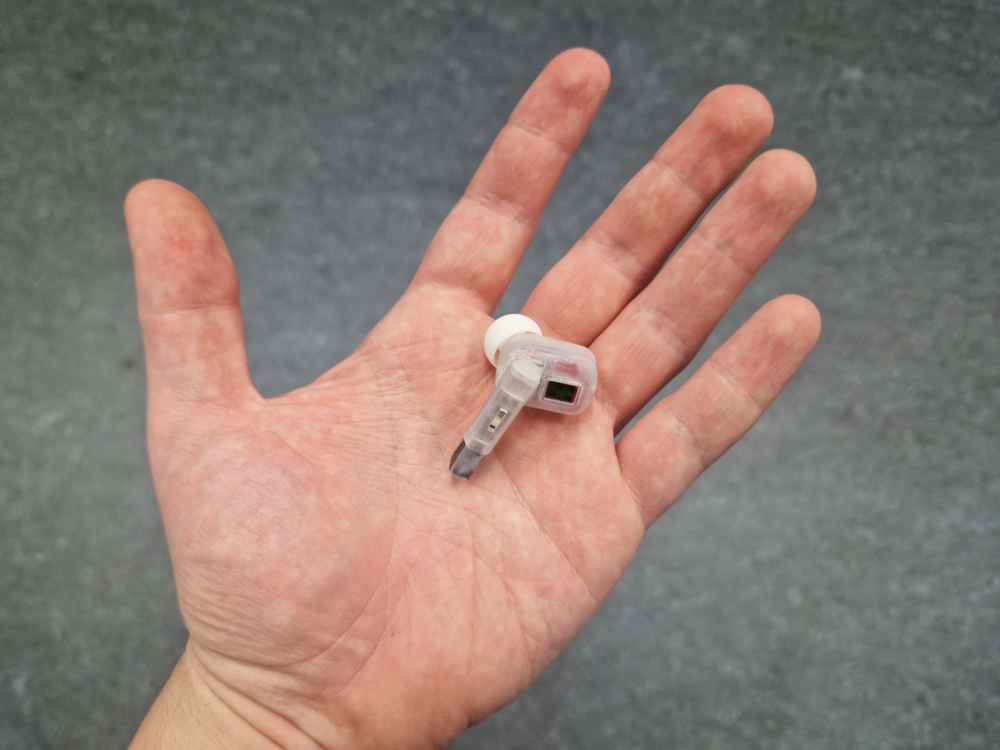RadarBud

Table of Contents
Overview
A low-power in-ear Hand-Gesture Recognition system based on 50GHz mm-wave radars, efficient spatial and temporal Convolutional neural networks and an energy-optimized hardware design.
This project was spearheaded by Andrea Ronco, who developed the whole algorithm and software during his master thesis. You can find his write-up of the project here. I contributed the main controller board (a VitalCore), physical design, and some firmware components.
Paper
We published a paper about this project, which you can find below. It contains more details about the radar and hand gesture recognition pipeline.
Hardware
The RadarBud is built on my VitalCore platform: a tiny controller board that features a fairly capable NRF53 SoC, full power and battery management, an IMU, a BLE antenna, and some extra flash. We extended it using a purpose-built "RadarPack" extension board, which features an Infinion radar and its supporting circuitry.
This stack is then placed in a custom case that was manufactured using a resin 3D printer. Besides the PCBs, the case also holds a 70mAh battery, a charge connector, and a power switch.
Operation

The set of gestures, as defined by Wang et al. Figure taken from Wang et al.
The RadarBud is capable of classifying within the set of 11 gestures, as defined by Wang et al. and pictured above. The dataset that was acquired for this project with these gestures is available here.
The radar generates a sequence of frames, each of which contains a number of radar chirps. Through an FFT, each radar frame is first converted into the Range-Doppler domain, yielding a two-dimensional range versus relative speed mapping.
The actual inference is performed using a multi-stage convolutional neural network (CNN), as is shown in the illustration above. Each frame is first pre-processed using a two-dimensional CNN in the Range-Doppler domain, generating a set of features that is fed into a 16-stage shift buffer, serving as an input to a temporal convolutional network (TCN). The final prediction is then generated with a small Multi-Layer Perceptron (MLP).
For more details on the algorithmic details, please take a look at our paper linked above.
Performance
The final quantized model is only 36KiB large, with a single inference time of 32.4ms on the VitalCore's NRF5340, and is capable of achieving a prediction accuracy of up to 94.9% under the right conditions. For all the details and caveats - including a detailed power analysis - see our paper linked above.
Links + References
- 🌍 Andrea's Post
- 📚 Paper
- 📚 Wang et al.
- 📁 Repo
- ⚙️ VitalCore
- ⚙️ Data Set
Our paper may be cited as follows:
@inproceedings{TinyssimoRadar,
author={Ronco, Andrea and Schilk, Philipp and Magno, Michele},
booktitle={2024 IEEE/ACM Ninth International Conference on Internet-of-Things
Design and Implementation (IoTDI)},
title={TinyssimoRadar: In-Ear Hand Gesture Recognition with Ultra-Low Power
mmWave Radars},
year={2024},
pages={192-202},
doi={10.1109/IoTDI61053.2024.00021}
}